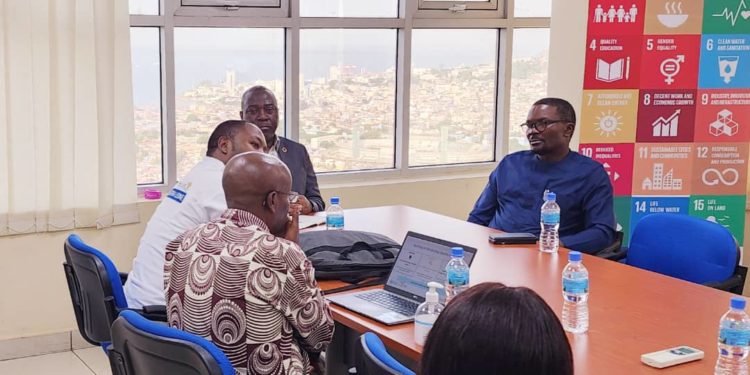By Kemo Cham
A joint mission of World Health Organization (WHO) and the Africa Centers for Disease Control and Prevention (CDC) experts is in Sierra Leone as part of a scoping mission to strengthen the country’s emergency preparedness level.
The delegation is working alongside officials of Sierra Leone’s Ministry of Health to identify priority areas and engage with relevant partners with the aim of establishing a common vision geared towards strengthening the country’s health security and emergencies.
The overall goal, according to a joint statement by WHO, Africa CDC and the Ministry of Health and Sanitation, is to strengthen Sierra Leone’s health security and emergency capacity to implement its Emergency Preparedness and Response initiatives.
According to the statement, consultative meetings will be held during the course of the one-week period the team will be in Sierra Leone, with relevant stakeholders. It adds that the findings of the mission will inform the development of strategic plans and initiatives that will help Sierra Leone better prepare for and respond to public health emergencies.
“Through this mission, health authorities will identify areas for the strengthening of the healthcare system, evaluate and improve health infrastructure, enhance capacity for emergency preparedness and response, and develop strategies that ensure the continuity of essential health services during emergencies,” the statement reads in part.
“The African Region faces a high burden of public health emergencies with increasing complexities, and although progress was made in the past, the COVID-19 epidemic has again exposed gaps in health emergency preparedness and response and health systems in general. This calls for urgent further strengthening of emergency prevention, preparedness, response, and resilience capacities at the country level, including in Sierra Leone,” it adds.
According to officials, the mission was born out of recommendations by African Health Ministers at the 72nd session of the WHO Regional Committee for Africa in 2022 to adopt a new strategy to transform health security in the region. It also forms part of the WHO regional Strategy for Health Security and Emergencies 2022-2030, which aims to strengthen member states capacities to effectively prepare, detect and respond to public health emergencies through three flagship programs: Promoting the resilience of systems for emergencies (PROSE), Transforming African Surveillance Systems (TASS), and Strengthening and Utilizing Response Groups for Emergencies (SURGE).
Dr Innocent Nuwagira, WHO Country Representative in Sierra Leone, said the scoping Mission exemplified the UN health agency’s global commitment to equitable health preparedness and response.
“Together with Sierra Leone, we are dedicated to fortifying healthcare systems and crisis readiness, ensuring the well-being of the nation’s people,” he was quoted in a statement.
“In this collaborative endeavor with Africa CDC, WHO is focusing on solidarity and preparedness, striving for a healthier and more resilient Sierra Leone and contributing to enhanced global health security,” he added.
The statement said the mission reinforces WHO Director-General, Dr Tedros Adhanom Ghebreyesus’ position on pandemic preparedness, which urges member states to endeavour to “stop the cycle of panic and neglect when it comes to pandemic preparedness.”
“We don’t want COVID-19 to repeat, we don’t want vaccine nationalism to repeat, and we don’t want people dying from lack of oxygen to repeat,” said Dr Ghebreyesus.
Sierra Leone is recognized for having undertaken several initiatives towards meeting these recommendations, including the piloting of the Universal Health Preparedness and Response, the Joint External Evaluation, and the identification of a diverse group of personnel that can be rapidly deployed in cases of emergencies both in the country and other countries in the region and elsewhere.
With this partnership, according to WHO, the identified persons will be provided relevant training and equipment, so that they are in a position to be deployed within 72 hours of need.
In an audience with the delegation, Deputy Minister of Health, Dr. Charles Senessie, noted that Sierra Leone was ready to learn from the team.
“There is a lot we can learn from past pandemics like the Ebola virus and COVID-19. These global health crises often strike when least expected, which is why we welcome this initiative as a nation,” he said.
He added: “We are eager to work with the team, exchange knowledge, draw from our collective experiences, and enhance our preparedness for future pandemics.”
WHO says the mission represents a crucial step in safeguarding the health and well-being of the Sierra Leonean population, as well as strengthening of the country’s resilience to emerging health threats.
Once completed, they said, the mission will develop a set of recommendations that will inform a two-year roadmap for actions tailored to specific needs to strengthen epidemic preparedness and emergency response in the country, thereby contributing to its national Action Plan for Health Security.






















